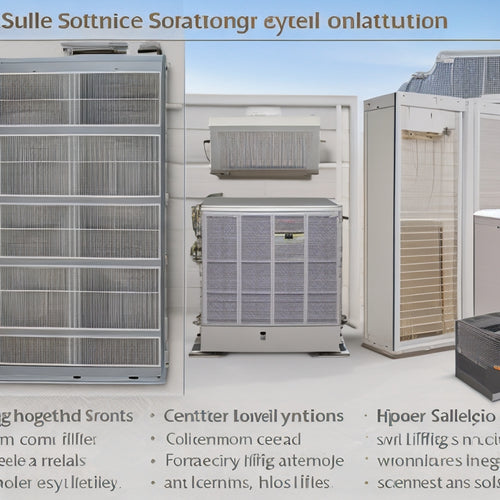
Purchase Solar Panels for EVS Online With Ease
Share
You're looking to purchase solar panels for your EV online with ease. You've come to the right place! Online shopping allows you to save time and money, compare products at your own pace, and access detailed product specs, reviews, and ratings with ease. But before making a purchase, you'll want to choose the right panel for your needs, considering factors like efficiency, durability, and warranty. You'll also want to make sure you're buying from a reputable online marketplace that offers certifications like UL or IEC. As you explore your options, you'll discover more about what to look for in a high-quality solar panel that meets your EV's charging needs.
Key Takeaways
• Compare online marketplaces to find the best deals on solar panels for EVs, considering factors like product variety, pricing, and customer support.
• Choose the right solar panel by considering efficiency metrics, energy needs, and durability factors like weather resistance and certifications.
• Read product reviews critically, looking for specific details, reviewer credentials, and recent reviews to make an informed purchase decision.
• Ensure online safety and security by checking for secure payment gateways, verified sellers, and reliable shipping options.
• Research government incentives and rebates to maximize savings and make purchasing solar panels for EVs more financially feasible.
Benefits of Online Solar Shopping
When you shop for solar panels online, you're likely to save time and money by avoiding the markups associated with physical storefronts and salespeople's commissions. This convenience factor is a significant advantage, allowing you to browse and compare products at your own pace, without feeling pressured by salespeople. Additionally, online shopping provides cost transparency, giving you a clear understanding of the prices and features of different solar panels.
You can easily access product specifications, reviews, and ratings from other customers, helping you make an informed decision. Online retailers often provide detailed product descriptions, including warranty information, certifications, and technical specifications. This transparency helps you identify the best solar panels for your electric vehicle, ensuring a safe and efficient charging experience.
Top Online Marketplaces Compared
You can find solar panels for your electric vehicle on various online marketplaces, each with its own strengths and weaknesses, and comparing them can help you make an informed purchase decision. When shopping online, you'll come across established players like Amazon and eBay, as well as specialized platforms catering specifically to solar startups.
Some online marketplaces, like EnergySage, focus exclusively on solar panels, offering a wide range of products from various manufacturers. Others, like Alibaba, provide a platform for businesses to connect with suppliers and manufacturers directly.
When comparing online marketplaces, consider factors such as product variety, pricing, shipping, and customer support. Look for marketplaces that offer certifications like UL (Underwriters Laboratories) or IEC (International Electrotechnical Commission) to make sure the solar panels meet safety standards.
Additionally, check for reviews and ratings from other customers to get an idea of the marketplace's reputation and reliability. By weighing the pros and cons of each online marketplace, you can confidently find the right solar panels for your electric vehicle.
How to Choose the Right Panel
When selecting the right solar panel for your EV, you'll want to ponder a few key factors.
You'll need to contemplate the panel's efficiency, as it directly impacts how much energy you can generate.
Panel Efficiency Matters
With a bewildering array of solar panels on the market, selecting the right one for your electric vehicle (EV) charging needs depends heavily on understanding the complex interplay of efficiency metrics.
As you navigate the options, it's important to take into account panel efficiency, which greatly impacts your energy harvesting capabilities. You'll want to look for panels with high efficiency ratings, typically above 20%, to maximize your energy yield. However, it's vital to be aware of panel degradation, which can reduce efficiency over time. Look for panels with minimal degradation rates to ensure consistent performance.
When evaluating panels, consider the temperature coefficient, which affects efficiency in high-temperature conditions. A lower temperature coefficient ensures your panels will perform well even on hot days. Additionally, pay attention to the fill factor, which indicates how efficiently the panel converts sunlight into energy. A higher fill factor correlates with better energy harvesting.
Assess Your Energy Needs
To determine the ideal solar panel for your electric vehicle's charging needs, calculate your daily energy requirements by taking into account factors such as your EV's battery size, charging frequency, and mileage. This will give you a clear picture of how much energy you need to generate from your solar panels.
Here are some key factors to keep in mind during your energy evaluation:
-
Battery size: A larger battery requires more energy to charge, so you'll need more powerful solar panels.
-
Charging frequency: If you charge your EV daily, you'll need a more robust solar panel system to keep up with demand.
-
Mileage: If you drive long distances frequently, you'll need more energy to recharge your EV's battery.
- Home energy usage: Consider your overall home energy consumption, including appliances and lighting, to make sure your solar panel system can handle the load.
Conducting an Energy Audit or Home Inspection can help you pinpoint areas of energy inefficiency and determine the right solar panel system for your needs. By accurately gauging your energy requirements, you can choose the perfect solar panel for your EV charging needs.
Compare Panel Durability
You'll want to scrutinize the durability of solar panels, considering factors such as their weather resistance, corrosion protection, and warranty, to make sure you're investing in a system that will withstand the elements and last for years to come.
When comparing panel durability, you should prioritize weather resistance, as it's essential for withstanding harsh environmental conditions. Look for panels with a high IP (ingress protection) rating, which indicates their ability to resist water and dust.
Additionally, examine the material quality of the panels, as high-quality materials will guarantee a longer lifespan. Check the type of glass or plastic used, as well as the frame's material and construction. A sturdy frame with a durable coating will help protect the panels from corrosion.
Understanding Solar Panel Specifications
As you explore solar panels for your EV, you'll encounter a list of specifications that might seem overwhelming at first.
To make an informed purchase, you'll want to understand the key metrics, including wattage and voltage, efficiency ratings, and durability factors.
Wattage and Voltage
Your solar panel's wattage and voltage ratings are vital specifications that determine how much electricity it can generate and how efficiently it can charge your EV. When shopping for solar panels, it's important to comprehend these ratings to make sure you're getting the right ones for your electric vehicle.
Here are some key points to bear in mind:
-
Wattage: Measures the solar panel's maximum power output. A higher wattage means more electricity generated, but also increases the panel's size and cost.
-
Voltage: Affects the efficiency of power conversion. A stable voltage ensures smooth power conversion and reduces the risk of voltage fluctuations that can damage your EV's battery.
-
Voltage Fluctuations: Sudden changes in voltage can harm your EV's electrical system. Look for solar panels with built-in voltage regulators or invest in a separate voltage stabilizer for added protection.
- Power Conversion: The process of converting sunlight into usable electricity. Efficient power conversion is crucial for fast and safe EV charging.
Efficiency Ratings
When selecting the right solar panel for your EV, understanding efficiency ratings is essential, as they directly impact the amount of electricity generated and, ultimately, your vehicle's charging speed. Efficiency ratings measure how effectively a solar panel converts sunlight into electricity. You'll often see this represented as a percentage, with higher ratings indicating better performance.
Cell Efficiency, a key aspect of efficiency ratings, refers to the percentage of sunlight that's converted into electrical energy by each individual cell. Look for panels with high Cell Efficiency, as they'll generate more power per unit area.
Rating Systems, such as those used by the International Electrotechnical Commission (IEC), provide a standardized way to evaluate and compare solar panels. These rating systems consider factors like temperature coefficients and low-light performance to provide a detailed picture of a panel's efficiency.
Durability Factors
You'll want to scrutinize a solar panel's durability factors, including the warranty, corrosion resistance, and certifications, to guarantee it can withstand the elements and provide reliable power for your EV over its lifespan.
When evaluating durability, consider the following key factors:
-
Weather Resistance: Look for panels with a high weather resistance rating, ensuring they can withstand extreme temperatures, humidity, and weather conditions.
-
Material Quality: Assess the quality of materials used, such as anodized aluminum frames and tempered glass, which provide added durability and protection.
-
Certifications: Check for certifications like UL (Underwriters Laboratories) and IEC (International Electrotechnical Commission), which confirm the panel meets rigorous safety and performance standards.
- Warranty: Review the warranty terms, including the duration, coverage, and maintenance requirements, to make sure you're protected in case of defects or malfunctions.
Reading Product Reviews Effectively
What features should you scrutinize in a review to verify it's a genuine assessment of the solar panels' performance for your EV?
When reading product reviews, it's important to employ critical thinking and effective review strategies to separate fact from fiction. To start with, look for reviews with specific details about the product's performance, such as energy output, efficiency, and durability.
Be wary of generic, overly positive reviews that lack concrete examples or data. Check the reviewer's credentials and make sure they've hands-on experience with the product. Additionally, pay attention to the date of the review, as outdated information may no longer be relevant.
Be cautious of fake reviews, which often use exaggerated language and lack specific details. By applying these critical thinking skills, you can make an informed decision about the solar panels' suitability for your EV. Remember, a well-researched purchase decision is important for ensuring your safety and the best performance of your electric vehicle.
Online Safety and Security Tips
When you're purchasing solar panels for your EV online, you're entrusting your personal and financial information to the seller's website.
To safeguard your online safety and security, you should only use secure payment gateways that encrypt your sensitive data. Additionally, you should verify the seller's credibility by checking for trust badges, such as SSL certificates and industry certifications, to guarantee a secure transaction.
Secure Payment Gateways
Before completing your online solar panel purchase for EVs, make sure the website utilizes a secure payment gateway, as it's crucial for safeguarding your sensitive financial information from potential cyber threats. A secure payment gateway guarantees that your payment details are encrypted and protected from unauthorized access.
Here are some key features to look for in a secure payment gateway:
-
Encryption: Confirm that the website uses industry-standard encryption protocols, such as SSL or TLS, to protect your payment information.
-
Fraud protection: Check if the website has a fraud protection system in place to detect and prevent fraudulent transactions.
-
Payment tokens: Look for websites that use payment tokens, which replace sensitive payment information with a unique token, reducing the risk of data breaches.
- Compliance: Verify that the website is compliant with industry standards, such as PCI-DSS, to ensure that your payment information is handled securely.
Verified Seller Checks
To safeguard your online solar panel purchase for EVs, you should thoroughly vet the seller by conducting verified seller checks, an essential step in guaranteeing your online safety and security. This critical step helps you avoid scams and fraudulent activities.
When verifying a seller's credibility, you should check for authenticating sources such as reviews, ratings, and testimonials from previous customers. Be cautious of sellers with low ratings or no reviews, as they may be fake or untrustworthy. Additionally, research the seller's physical address, contact information, and business registration to make sure they're legitimate.
You can also check if the seller is certified by reputable organizations, such as the North American Board of Certified Energy Practitioners (NABCEP). By taking these steps, you can ensure that you're buying from a credible seller, which is essential for a successful and secure online transaction.
Fast and Reliable Shipping Options
You can expect your solar panels for EVs to arrive promptly, thanks to our partnership with reputable shipping carriers that offer fast and reliable transportation services. This guarantees that your solar panels are handled with care and arrive at your doorstep in a timely manner, giving you peace of mind.
Here are some key benefits of our shipping options:
-
Carrier Partnerships: We've partnered with trusted carriers to make certain your solar panels are shipped efficiently and safely, no matter where you're located.
-
Rural Accessibility: We acknowledge that some of our customers may live in rural areas, which is why we've made sure our shipping options cater to these regions, ensuring equal access to our products.
-
Real-time Tracking: Stay updated on the status of your shipment with our real-time tracking feature, giving you complete visibility over your delivery.
- Secure Packaging: Our solar panels are carefully packaged to prevent damage during transit, ensuring they arrive in perfect condition.
With our fast and reliable shipping options, you can focus on getting your EV charged and on the road, while we handle the logistics.
Warranty and Support Considerations
When purchasing solar panels for your EV online, it's crucial that you take into account the warranty and support offered by the supplier, as an extensive warranty can provide peace of mind and protect your investment in the long run.
A thorough warranty can cover defects, repairs, and even replacements, giving you assurance that you're safeguarded in case something goes wrong. Look for suppliers that offer Extended Warranties, which can provide additional protection beyond the standard warranty period.
Additionally, consider the level of Premium Support offered by the supplier. You want to make sure that you can easily get in touch with the supplier's technical team if you encounter any issues with your solar panels. A reliable support team can provide troubleshooting assistance, maintenance guidance, and even on-site support in some cases.
Installation and Maintenance Needs
Properly installing and maintaining your solar panels is vital to guarantee they operate at peak efficiency, optimizing your EV's charging capabilities. When you purchase solar panels online, it's important to take into account the installation and maintenance needs to ensure a safe and efficient charging experience.
To guarantee a smooth installation process, take into account the following:
-
Ground preparation: Make sure the area is clear of debris and obstacles to allow for a secure and level installation.
-
Electrical inspections: Hire a licensed electrician to inspect your electrical system to confirm it can support the added power of your solar panels.
-
Structural integrity: Confirm that your roof can support the weight and wind resistance of the solar panels.
- Regular cleaning: Clean your solar panels regularly to preserve their efficiency and performance.
Government Incentives and Rebates
Installing solar panels for your EV can also bring financial benefits, as governments offer various incentives and rebates to encourage eco-friendly practices. You can take advantage of these offers to offset the initial investment in your solar panel system. For instance, you may be eligible for Tax Credits, which can greatly reduce your tax liability.
Additionally, you can explore Federal Grants that provide funding for renewable energy projects, including solar installations for EV charging. These incentives can help you recoup a large portion of your investment, making it more feasible to switch to a sustainable energy source.
When purchasing solar panels online, it's crucial to research the available government incentives and rebates in your area. You may need to meet specific requirements, such as installing a system that meets certain efficiency standards or obtaining certifications from recognized organizations. By understanding the incentives and rebates available, you can make an informed decision and maximize your savings.
Frequently Asked Questions
Can I Install Solar Panels on a Rented Property?
"When in Rome, do as the Romans do" - but as a renter, you're stuck in a Renter's dilemma. You'll need to address your Landlord's concerns about liability, maintenance, and lease agreements before installing solar panels on a rented property.
Are Solar Panels Affected by Extreme Weather Conditions?
You'll be relieved to know that solar panels are designed to withstand extreme weather conditions, boasting impressive weather resistance and climate durability, ensuring your safety and energy production remain unaffected.
Can I Sell Excess Energy Back to the Grid?
You can sell excess energy back to the grid through net metering, achieving grid parity, where your utility bill is offset by the energy you produce, ensuring a safe and efficient way to optimize your solar panel investment.
Do Solar Panels Work During a Power Outage?
Like a lifeline in a storm, you're wondering if solar panels rescue you during a power outage. Unfortunately, no, they don't work during outages, but with Grid Backup and Energy Storage systems, you can stay powered up and safe.
Are Solar Panels Recyclable at the End of Their Life?
You'll be relieved to know that solar panels are recyclable, with energy recovery and material reuse possible at the end of their life, ensuring a sustainable and environmentally friendly solution for your energy needs.
Related Posts
-

Why Solar HVAC Filters Revolutionize Home Energy Efficiency
By adopting solar HVAC filters, you're shifting your home's energy reliance from fossil fuels to clean, renewable sou...
-

How to Upgrade Your Home With Geothermal Innovations
You're now on the cusp of utilizing the Earth's natural thermal energy to revolutionize your home's heating and cooli...
-

10 Best Sustainable Waste Management Solutions for Green Homes
You're likely unaware that the average green home generates over 2 kilograms of waste daily, but with the right susta...


